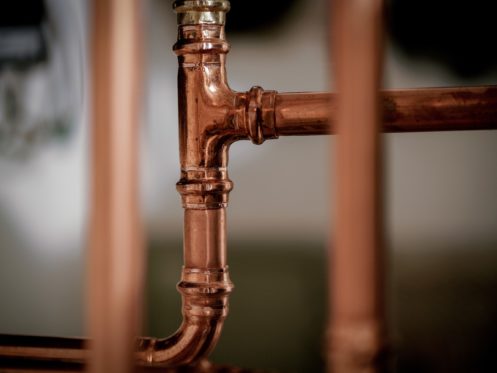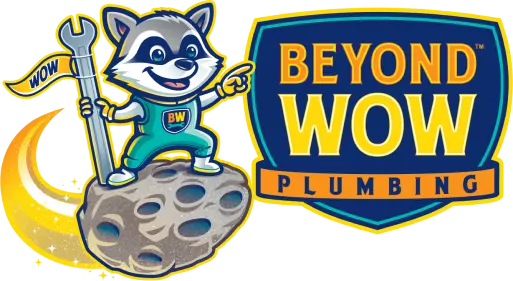
Why Copper Is Used in Plumbing

For their many virtues, copper pipes are arguably the most preferred plumbing material. Most of our clients at Beyond Wow choose copper pipes because we’ve educated them on this topic, and they believe in us.
In this article, we’ll explain why copper is the most prized material for plumbing pipes.
If you need to schedule repiping services, contact Beyond Wow at 512-365-8866.
Types of Copper Tubing
There are two major types of copper plumbing pipes.
- Soft copper: This is the annealed and bendable type. You can easily bend soft copper pipes to avoid obstacles when you’re working.
- Rigid copper: This is the hard-drawn type commonly ideal for water lines. You can rarely bend these pipes, although you can also make them softer through careful treatment. Instead, you’ll use copper tube benders or elbow fittings to avoid obstacles.
The broad categories are subdivided into four, namely, K, L, M, and DWV (drain-waste-vent).
- Type K pipes: Type K copper pipe is ideal for major water lines and underground installations. We use type K for water, oil, and HVAC distribution as well as fire protection. We have rigid and flexible K pipes. You can identify it by its green stamp.
- Type L pipes: We use L pipes for interior plumbing, some HVAC, and fire protection. You can get rigid or flexible forms. Type L is more widely used than K. We use it mostly for replacements and repairs. It’s thinner than K. We usually give it a blue stamp, and our experts use it for indoor water supply.
- Type M pipes: Type M is best for water heating applications and vacuums. It’s cheaper and ideal for its affordability. You can identify an M by its red markings. Most of our DIY clients prefer M. The clients like it because it’s easy to use, though there’s no rigid variety.
- DWV pipes: DWV is used almost exclusively for drain-waste-vent plumbing. However, most homes prefer PVC and ABS currently. Yellow markings identify it.
Copper pipes and accessories have long-term benefits. Most plumbers prefer them for several reasons, including those explained here.
Why Use Copper for Your Plumbing?
Copper is durable, impermeable, reliable, and non-corrosive. It also lasts longer.
Lead-free
Copper pipes don’t contain lead. Original copper fittings and tubes lack a lead component. Plumbing solders and fluxes have been lead-free for three decades now.
You should consistently use lead-free solder to connect copper pipes. Lead poisoning is a hazard to humans, especially children, and lead in water pipes is to be avoided at all costs.
Comparison With Plastic
Copper pipes (made of 99.9% copper metal) are more durable than cross-linked polyethylene (PEX) and other plastic pipes. Unlike plastic pipes, copper does not expand and contract insignificantly. That’s why foreign substances don’t easily seep into the pipes.
Also, unlike plastic pipes, copper pipes are resistant to UV rays. Rodents don’t tamper with copper pipes. Although that last possibility is fairly uncommon, plastic pipes pose dangerous risks when it happens.
Durable
Copper pipes withstand extreme conditions for a long time, lasting 50 to 70 years. Oxidizing chemicals like chlorine do not crack these pipes.
Impermeable
Copper pipes keep foreign substances at bay. Such chemicals as petroleum products, fertilizers, and insecticides are prone to spill at homes. These won’t contaminate your water if the system is composed of copper pipes.
Heating Systems
Copper pipes are ideal for heating systems. Copper metal melts at 1,980 degrees Fahrenheit. So, if you intend to install lines that convey hot water and steam, copper is your ideal choice. Copper has higher thermal conductivity, making it suitable for heating systems and saving you money on utility bills in the long run.
Not Susceptible to Rust
Unlike steel pipes, copper pipes don’t rust. Although, they may corrode when they come into contact with acidic water.
Easy To Bend
Copper pipes are ductile. You can bend them without straining, and you can rarely find kinks after reshaping or bending them. Kinks significantly affect seamless water flow, so the absence of them is a significant advantage.
The Pros of Using Copper Pipes
- Health benefits: Copper metals have natural antibacterial properties. They’re also biostatic and impermeable to foreign objects. Copper pipes don’t sag or crack easily, even after several years. Robust copper pipes don’t allow contaminants into the water.
- Resistance to corrosion: Copper pipes don’t corrode easily unless the water is acidic. Iron and steel pipes corrode and rust easily. This characteristic makes copper the ideal plumbing material.
- Non-toxic: Copper pipes don’t burn or support combustion whatsoever. In case of fires, the pipes don’t catalyze the spread of the conflagration. Due to their nontoxicity, copper pipes do not contaminate their surroundings.
The Cons of Using Copper Pipes
- Installation costs: Copper is more expensive than other piping materials. Since they’re also rigid, you must incur the cost of elbow fittings. The rigidity makes them more challenging to cut and fix during installation. The longer it takes to handle the materials, the more cost you incur.
- Leaks & drips: Copper pipes resist corrosion but don’t have immunity to it. You’ll realize that if water is acidic, the pipes corrode gradually, causing pinhole leaks. Copper pipes don’t expand and contract significantly, so they’re prone to burst and leak if the water in them freezes. In case you notice or suspect any leaks, Beyond Wow is your go-to company in Austin, TX. We have over 40 years of excellent service. Our experts are quick, careful, and accurate.
How Long Do Copper Pipes Last?
Although copper pipes have the most extensive lifespan (up to seven decades), they tend to deteriorate after two decades. They begin to fail gradually, mainly due to constant high pressure.
Pressure affects the joints and system connectors. Leaks and drips are common as well. If you can get a pressure regulator and have it installed, this will help you greatly.
You should repair and replace faulty copper pipes regularly. Healthy precautions are our priority, and we advise you to do pipe maintenance on a routine basis. You can rely on our team for this. We offer excellent plumbing services in the Austin, TX, area.
For copper pipe repair, maintenance, and replacement, count on Beyond Wow. Contact our professional plumbers at 512-365-8866.
Ready for Out-of-This-World Plumbing Service?




